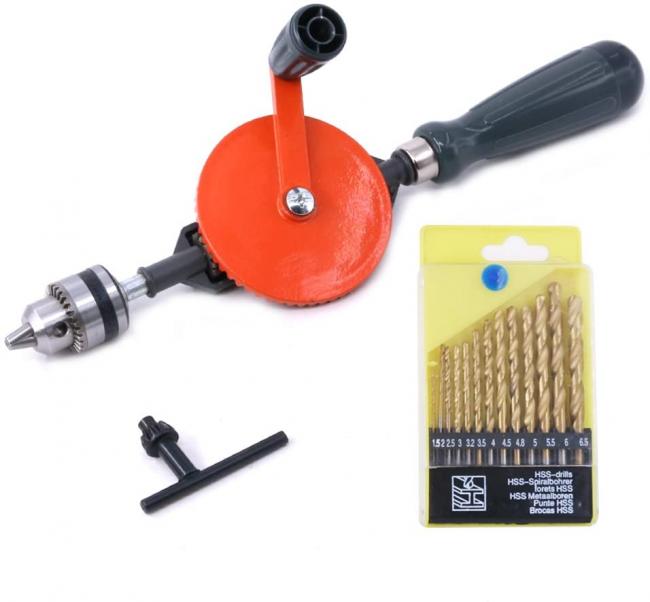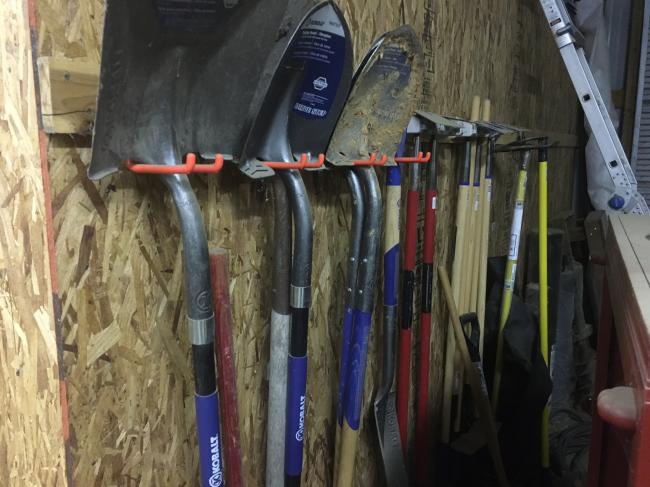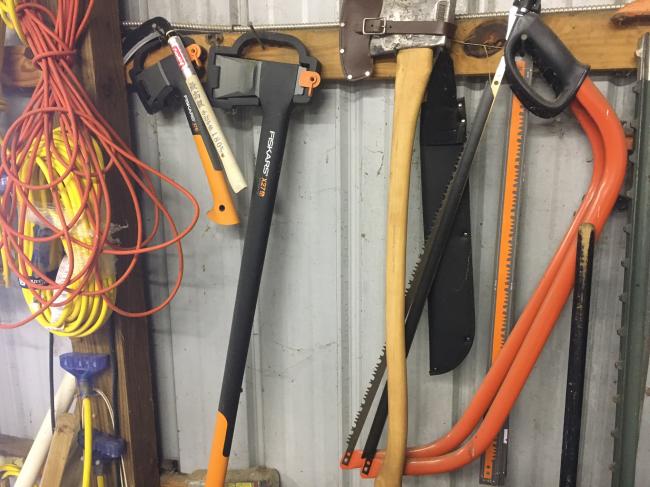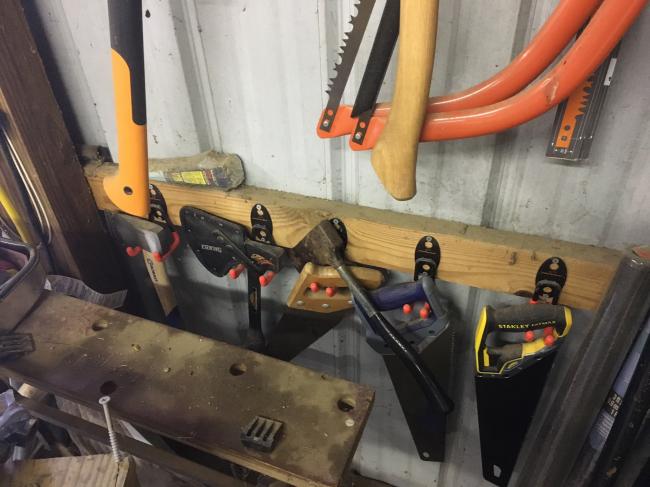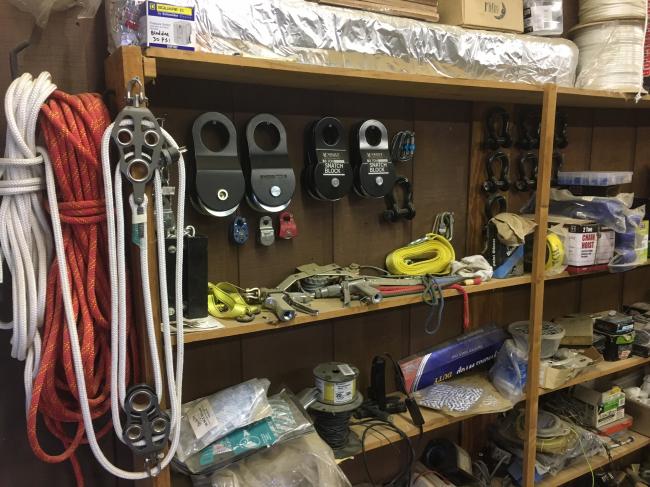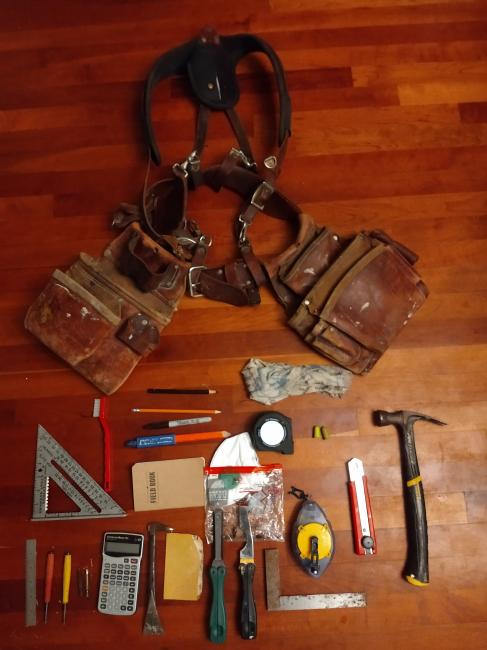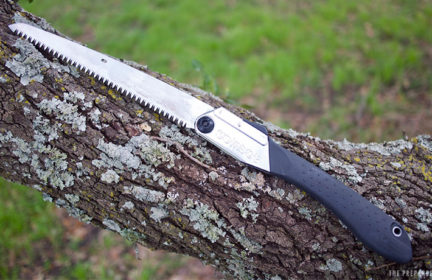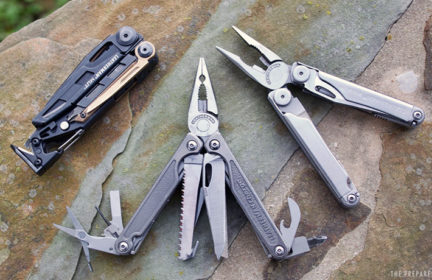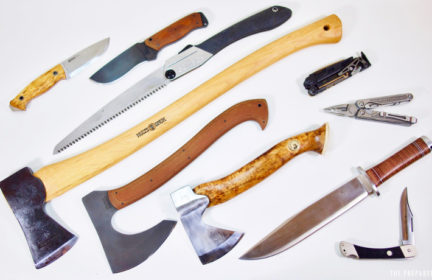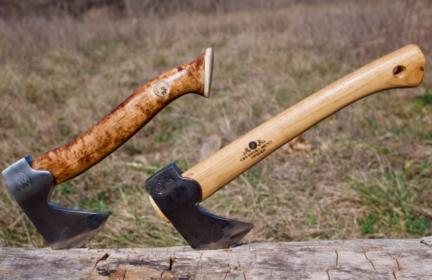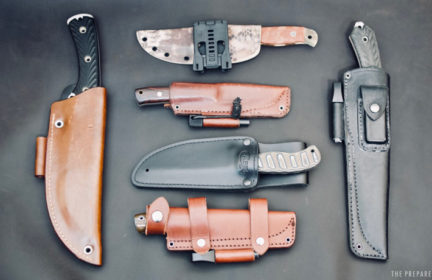What are some valuable tools to have on hand?
I’m talking about things like shovel, rake, hammer, drill, air compressor….
I am wanting to build up the tools that I have on hand for day-to-day repairs and living, but also for an emergency if high winds comes through and knocks some shingles off my roof, or a window breaks. I don’t want to have to run to the hardware store as my roof is leaking and buy a hammer and nails, I want to be prepared and ready.
-
Comments (85)
-
Bob - January 15, 2021
Oily,
Forgot if at TP.com but had written somewhere to NEVER climb on a roof. If already under stress, never THINK of climbing on a roof.
You know the basics. Augment the tool box/”kit” with some steel brackets; a couple fo straight steel ones, some L shaped, some T shaped, some H shaped and quality screws….sometimes coming in blister pack from big box store. A couple of tubes of adhesive and some mallable wire help.
Fire proof tarps (somewhat expensive are ideal to accompany tool box. Consider a couple of vinyl shower curtains to patch up broken windows with a good tape.
Work gloves (plural) since the broken glass is all over the place.
-
Olly Wright - January 15, 2021
I totally agree with the work gloves idea Bob. There is no way that I’d be going through rubble, splintered wood, and sharp metal without a good pair of gloves.
-
Caliber Carpenter - January 15, 2021
As someone who both builds and climbs on roofs often I can tell you that is quite false. You can climb all over a roof without hurting it provided the roof isn’t rotten. Most repairs to shingle roofs wouldn’t be too hard to do yourself so long as your roof isn’t at a crazy steep pitch. Caulk and a specific caulk called NP1 are your best friends for patching holes in a roof.
-
Bob - January 16, 2021
TITW,
Do go over some insurance reports.
You are in good shape and knowledgeable about identifying rotten roofs.
Most cannot.
-
Caliber Carpenter - January 16, 2021
If a roof is in that bad of shape it will be fairly easy to identify. Just look for dips in the shingles or any spots that appear to be low. If you need to test it simply pressing on the spot with your had or a tool will tell you if it’s soft and therefore rotten. I’m not encouraging people to all start climbing on their roofs and making repairs, but in a SHTF situation where you have no alternative it is entirely possible to do it yourself. If you’re uncomfortable walking on a roof or you have a metal roof, which are ridiculously slick, then simply screw or nail in some toe boards to get yourself foot and hand holds, just make sure to caulk the holes back once you remove them. If you’re really concerned about it, tie yourself off with a rope and either have someone hold the other end on the other side of the roof or make yourself an anchor point on the roof. All I’m saying is it is entirely possible to fix it yourself if you had to, much better than letting a leak continue.
-
Dog lover - January 16, 2021
The only thing you can’t do yourself is the thing where you say to yourself that you can’t do it and don’t even try. Always think things out and be safe, but you would be surprised what your capable of. I have built three houses by myself. When I say myself, I mean by my own two hands by myself. The last one, which I’m living in now, I used a sawmill and even cut the lumber for it. I built the cabinets, did all the mechanical and even put in the septic system. I did hire someone to drill the well, but I installed everything after they dropped the pump down the bore hole. My point here is I’m nothing special. Reasonable intelligence but not anything out of the ordinary. I am smart enough to learn anything that I’m not familiar with. I read books mostly to learn about how to do things but now days with UTube you can watch a video on just about how to do anything. Don’t sell yourself short without trying things.
-
Olly Wright - January 16, 2021
Dog lover – that sure is inspiring! Thank you, I needed to hear that today.
That has always been my dream to build a house by myself. Pretty cool that you have done that three times.
-
Caliber Carpenter - January 16, 2021
This man gets it ^^^
One of my favorite sayings is “20 minutes on YouTube will save you 2 hours of frustration”
-
Olly Wright - January 16, 2021
This is the way – Great advice about roofing. some toe boards would be smart to install on a metal roof. And having the wife anchor me down with a rope would be smart too. I know how to tie a bowline, so at least I won’t cut myself in half when I fall.
-
Bob - January 17, 2021
Good morning TITW,
Understand post; appreciate specifics.
It’s not THAT easy to identify roof damage on condos and houses in metro-Washington, D.C.
I am saying the opposite of your above view. In a SHTF situation, it is worth considering to NOT go on a roof. I’ve worked too many rescues and still routinely deal with insurance companies and emergency medic personnel.
Later, maybe the damaged roof can be repaired. The better preparedness for housing is to learn about risk management – typically being insurance contracts and alternatives such as FEMA stipends and USACE tarps with help (sometimes) from emergency responders for rigging it.
Much (>51%) of the national population, to include serious preppers, have physical conditions precluding going on a roof. Even here at TP.com several told of their physical conditions.
I’m retired from the overseas oil industry. A major safety violation ends employment in the oil exploration industry.
For post – event roof damage, I strongly recommend to consider hiring a contractor.
-
rangerjohn - September 26, 2021
True that on the metal roofing.
Had asphalt shingles, on a standard standard double wide roof slope. I had to go up and shovel it off maybe once a winter. I never felt any concern about falling. Actually, I didn’t have any safety gear.
Three years ago, SWMBO decided that I was too old to go up and shovel the snow off the roof, and talked me into going with a metal roof. World of difference.
I wouldn’t be up there without safety gear, now. I also have safety gear now, for when I need to go up there.
-
Olly Wright - September 26, 2021
That’s another positive for metal roofs, less snow accumulation and less having to mess around with them and risk falling. They are also handy for rain collection because you don’t have to worry as much about asphalt getting into your water.
-
rangerjohn - September 26, 2021
That wss my wife’s argument for getting a metal roof.
-
Bob - September 26, 2021
Good evening Oily Wright and Ranger John,
Now highlight the thread’s “high winds” as part of the emergency you’re working.
One of the biggest rescue opns, besides the late middle age man shoveling snow with follow-on heart attack (roads temp closed due heavy snow; too few ambulances anyway), involves those falling off roofs after stressed out.
Here, “high winds” are gale force – 40 mph +. The healthy and young who are stressed out fall off of roofs. Others have more permanent experiences in the unpleasant category. Besides dealing with the medical folks, it’s the insurance companies giving clearer and better info on this aspect of preparedness.
-
-
Rich DCContributor - January 15, 2021
This is a great topic. I might suggest expanding it to include consumable non food/water/first aide materials.
Some things I do have:
- “basic” hand tools (power drill, hammer, files, lots of pliers, some wrenches, screw drivers, Allen wrenches, etc). Nothing too fancy.
- A bucket
- snow shovels, regular shovels, and some garden tools. Including a garden saw that lives in my go bag.
- Rubber mallet
Consumable materials:
- A variety of different types of nails/screws/nuts/bolts most of which can be used with wood.
- A large roll of plastic sheeting and a tarp (think patching a broken window to keep rain out until it can be replaced)
- Spray foam (gap filler)
- Spare tubes of Caulk
Honestly most of that is for normal every day life that can pull double duty. Some prepping specific tools that are on my radar and I am considering for the future:
- Sledge Hammer (or maul? The slege-axe hybrid tool?)
- Hatchet
- pry/crow bar
Its kind of a hodgepodge but I’d be interested in advice for expanding/enhancing it without needing a full wood-shop/fabrication-shop.
-
Bob - January 15, 2021
Rich,
Not advice; just afternoon rambling.
If going “full blast” for a hybred, spend some time surfing around some of the firefighters’ sites. Their stuff is typically expensive but ideas get provoked. Above link is place I buy from but not making recommendations.
Check on the Stanley brand Fat Max FuBar and the Vaughen Raje. Both of these hybreds are carried in the big box stores; cost much less than the firefighter stores.
My prepper philosophy requires both multiversatility and car portability … fully aware I’m making trade-offs. This philo also governs my drill selection; have both electric and manual drill. In a push/shove situation, the manual one is loaded for evac.
Before retirement to my BOP shack here, used to live and work in D.C. although most time in Asia at the oil fields. My orientation is small size stuff and light weight. My 30 ft telescoping pike pole is now useless to me; it’s too heavy for a Vintage Virginian/Senior Citizen.
-
Olly Wright - January 15, 2021
I really like that idea of storing some spray foam and caulk tubes.
I think those would be so valuable if a disaster like a hurricane or tornado came through your neighborhood. Not the total destruction of your house hurricane, but if everyone has minor damage to their homes and are leaking, some spray foam and caulk can probably save you some real water damage.
-
matthew.Contributor - January 15, 2021
This is a very broad question so it would be very helpful to know where you are starting from and what you hope to accomplish. Are you planning on doing home-improvement projects? Starting a garden? Or do you just want to have some tools tucked away just in case?
If you are starting from scratch, go with the basics: screwdrivers, pliers, wrench, hammer, ratchet, etc. Build up a basic toolbox first. From there, begin to specialize in the direction you’re interested in. A rake is great for gardening and lawn care, but worthless when it comes to fixing your roof. This is all pretty basic stuff I’m sure you already know, but do recognize that there are entirely different sets of tools for different jobs – so perhaps identifying your priorities is a good place to start. Carpentry is different from plumbing and also different from electrical work- while there are some tools that cross-over (hello wrench), each will also have tools that are rather specific.
That said, here are a few thoughts from my own experience and with an eye towards prepping.
- A cordless drill is the only tool I’ve worn out and needed to replace multiple times. A good drill is worth the extra money because you’ll likely use it more often than you might think. I’m personally a fan of DeWalt.
- While a crowbar is an obvious tool for a prepper, you might be surprised just how often you use it. In my toolbox it wins the “surprised how often I use it” award.
- Power tools are great, so long as you have power. If it only works when plugged into a wall, consider having a manual version as a back-up if you imagine needing it in an emergency.
- Save the extra screws, allen wrenches, and various bits that come with things you buy and have to assemble. I’m always surprised how often I can find uses for those things.
-
Olly Wright - January 15, 2021
I’m interested in getting a good cordless drill. haha I bought like 5 of them from Harbor Freight when they went on clearance for $5 each. They worked well, but don’t really hold a charge anymore. But I got years of work out of them for $5, so i’m not complaining too much.
Thanks for recommending DeWalt. Does anyone else have any other cordless drill brand recommendations? I just want to find out what most people are using.
I want to get a little solar panel and small solar generator so I can charge battery operated tools even if the grid goes down.
-
Dog lover - January 15, 2021
I am a dewalt fan, my son is a Milwaukee fan. I honestly think the Milwaukee is slightly better designed and more ergonomic but the dewalts have lasted me for years even with commercial use. You wouldn’t go wrong with either. As far as harbor freight, everything I’ve bought from them left me less than satisfied. Pretty low quality, but I understand when it’s only 5$ you can buy a bunch of them and consider them disposable. If you can afford better quality great, but if not at least it’s an option.
-
Caliber Carpenter - January 15, 2021
As a contractor, I can tell you that the majority of contractors use DeWalt and there’s a reason for it. They’re some of the most durable tools out there. I’ve dropped an impact driver 30ft to the ground with no damage before. My handheld circular saw fell a good 15ft the other day with no damage to the saw. Cracked the battery but that’s because it landed right on it.
-
Dog lover - January 16, 2021
I am a contractor as well. Most of my dewalts, and I have almost every one of them, are 20 yrs old and still working fine. They are the 18v and have gone through multiple batteries but the tools rarely fail. It is getting harder to find the 18v batteries now as most places only carry the newer 20v now. I had three of the hammer drills and one finally bit the dust, but that was after drilling countless holes in concrete. I am starting to switch to the Milwaukee now as I want all the tools standardized on our service trucks. My truck is the only one with dewalt. Those tools will go into my shop though and continue to do stuff around the house.
-
Olly Wright - January 16, 2021
When at home, do you guys keep your cordless power tool batteries on the charger all the time?
I guess it wasn’t recommended with the old Ni-cd ones, but these new lithium ion batteries should be fine with their improved charge controller right?
-
Caliber Carpenter - January 16, 2021
Nah, I’ve left them on the charger overnight before, doesn’t hurt them. Mine have held a charge for up to 2 weeks before and could maybe go longer honestly, I dont ever go too long without using them to know.
-
Olly Wright - January 16, 2021
If DeWalt is Mandalorian approved, it must be good!
-
Caliber Carpenter - January 16, 2021
You pay a pretty penny for DeWalt but they are worth it to me. Especially for their brushless series. I have a hammer drill from them as well and that sucker absolutely eats through concrete. Their brushless impacts are ridiculously strong too, and have adjustable drive amounts, which is nice when you’re screwing into different types of materials.
-
Dog lover - January 16, 2021
The brushless tools are worth the extra money, regardless of brand. They get a lot more run time out of the battery.
-
Olly Wright - January 16, 2021
Isn’t that just an improved motor? Less friction and heat? Do those last longer as well?
-
Caliber Carpenter - January 16, 2021
Yes brushless will have a longer overall life as well
-
Bill Masen - February 10, 2021
FYI did you know Dewalt is owned by Black N Decker and their power tools are or were made with Bosch assembly lines. I got to visit their huge power tool plant near my home a few years ago 🙂
-
Dog lover - January 15, 2021
I got extras of all the normal yard tools and such. I have a wood working shop and some metal working tools too. I’ve always worked with my hands and am a big do it yourself er so already had most tools. After a Sunday morning pile burst a couple years back I realized that you also need supplies to go along with your tools. So I started stocking up on plumbing and hardware supplies. Everyone has different needs and skill levels so just start with what you know you can use and expand from there.
-
Olly Wright - January 15, 2021
Great advice! I think I want to start stocking up some supplies to prevent having to go to the hardware store as much for that random bolt, or another foot of PVC.
-
hikermor - January 15, 2021
Second the recommendation for a cordless drill with manual backups – various types available. Also thee crowbars – get an assortment of sizes. Mine are from six inches to four feet in length. All are quite useful.
A good set of how to books will serve you well. i recommend Better Homes and Gardens Big Book of Home How -To. My copy is dated 2003 and I am sure it is not the only one available. Especially necessary if you get into plumbing or electrical systems, areas where money spent for pros is money well spent.
You need cutting tools – utility knives, hand saws of various sorts for cutting wood, and a hacksaw for metal. I would look at cordless varieties of sabre saws.
One thing about cordless tools – stick to one brand so that the batteries are interchangeable. .Rechargeable batteries are often a very significant portion of the cost of the tool. They also come in handy as power banks with propeer attachments to recharge phones, etc. during power outages.
I find that in prepping for major projects, i often acquire at least one new tool which often proves surprisingly useful and versatile.
Don’t forget the duct tape, aluminum foil, epoxy glue, and other versatile items.
Gloves, goggles, and other PPE items will also be useful…
-
Olly Wright - January 16, 2021
Great recommendations hikermor. I do want to stock up on things like duct tape, epoxy, super glue, wood glue, etc…
You say to have manual backups of your cordless tools, which I agree with I want to have screw drivers, hand saws, and more. Do you have a manual drill?
I think i’d like to try one of these some time. I bet it is slow as heck, and a lot of work, but better than nothing if the power goes down.
-
-
RedneckContributor - January 16, 2021
I’m gonna come at this more from the perspective of tools needed during a crisis where you don’t have electricity & maybe won’t have help for days or weeks… or if we include post SHTF, then months or years. So I took some pics in my upper barn of some tools I keep & find important.
First, I keep lots of hand garden tools, to include all sorts of shovels, hoes & rakes. Rogue makes incredible hoes that will last a lifetime & make the work so much easier.
Second, I like to have plenty of hand tools for working with trees, etc. I have lots of chain saws, to include battery powered, but I think every prepper should be able to cut trees & limbs by hand. A great felling axe is nice. Bow saws can cut really quickly so I keep several and maybe a dozen replacement blades. But any assortment of saws, hatches & axes are great to have handy.
Thirdly, having the tools to do heavy lifting by yourself could save a life. I keep all sorts of pulleys, blocks, block & tackle, chain hoists, come along etc. Also important to have large quantities of quality rope in all different sizes.
-
Olly Wright - January 16, 2021
Thanks for the pics! And thanks for name dropping Rogue. That is what I want, tools that are incredibly tough and will last a lifetime.
Nice collection of pulleys. Super smart to use those and not kill yourself.
-
Bob - January 17, 2021
Ref: mentioned long term perspective
Re: quality rope
Completely agree. Applicable to some of us, must mention certain different TYPES of rope.
My prepper plans are for a short haul evac about one half to1 NM offshore. My Zodiac will tow 2 large rafts with supplies. There are 4 types of tow ropes involved. 1: a highly visibly rope that floats, 2: an “invisible” rope that floats, 3:a a high viz rope that sinks, 4. an “invisible” rope that sinks. Not applicable for the basics, but must mention a spool of graphite lubercated wire rope.
So much depends on weather conditions and situation.
Here, also, have worked with trees – and railroad ties with the spikes bouncing around on the water.
Some of the really experienced know about ropes built to stretch and not to stretch. My focus is on ropes manufactured for minimal chaffing.
You’re well organized. Besides driving a motor vehicle on public roads, my other dangerous event in life is entering my barn ! Never could get appropriate tool racks for the stuff in the place. It’s on my list of things to ……. (Famous words !)
-
-
Alicia - January 17, 2021
Sounds like you have a couple really good resources here already from TITW and Doglover. One safety tool that I have found both prevents injury and increases confidence: Non-contact voltage detector. I’ve had a different version for decades and it’s helped me discover the cross-wiring in my 1988 house when replacing an outlet or upgrading to a dimmer switch. With it I know the wire is safe to mess with – possibly vital in a weather situation. There’s a gas detector as well that I’m planning to get before we consider moving a gas fire pit. No experience with that one yet.
If, during an emergency, you found your main house water valve is failing or damaged, you need to stop the water up stream. We learned that we needed a special tool with a longer T shaped lever arm to shut off the water to the house at the in-ground connection by the street. The wrenches that fit the coupling didn’t provide enough leverage.
I can also attest to having supplies on-hand being helpful. During a wild fire evacuation situation, I screwed plywood over my attic vents to prevent embers from entering. That needed a cordless drill/driver, screws (several as I kept dropping them down into the insulation) and plywood. I also could have used a tarp and stapler. (I’ve since added hinges and hasps so this can be done much more quickly). I’ve seen tarps used to temporarily cover roof leaks, like a large sand bag with rocks/sand to direct water flow, and to cover hillsides to prevent erosion and mud slides (the blue landscaping trend). I’ve also had a hose clamp with a bit of bike tire inner tube temporarily fix a pin hole leak in copper pipe until I could get a plumber out to fix it. That hose clamp was in my car kit. And I second caulk as pretty useful – like permanent duct tape. I used a gob-stopping amount to stop a leak in a shower drain that lasted until a remodel several years later.
-
Olly Wright - January 18, 2021
Lots of great suggestions here! Thanks Alicia.
I do need to get a non contact voltage tester. I just have a multimeter, which requires you to touch exposed wires, so getting one of those would be much safer.
You’ll have to let me know how that gas detector works if you get one. I’m curious to know how they work.
I thought that was really smart about using a hose clamp and a piece of bike tire to temporarily fix a leak in a copper pipe.
-
Alicia - January 19, 2021
You are so welcome, Olly.
re: Gas detector – will do.
I cannot really recommend a ‘magic marker’ voltage detector more. Mine was about $10 years ago and I’ve purchased them for many friends as a housewarming gift.
Re: hose clamp: Props go to the plumber. He trusted my skills and suggested it. I just made it happen.
-
Dog lover - January 20, 2021
I am an electrical contractor, and I’m not bashing any tools to help anyone be a better do it yourself er but do have a warning about those pen testers. First off, always test it on another known live circuit. They have been known to just stop working and can give you a false sense of safety. The other thing to be aware of is a neutral wire can possibly shock you as well. In commercial work one shared neutral can carry the load back to the panel for three circuits. Basically that means it can shock you more than the hot wire. I am a big fan of a real meter that can tell you exactly what is going on. Another thing to help keep you safe is never touch the copper end of the wire. Always only touch the insulation on the wire and use a tool with an insulated handle (plastic coated) to touch the copper if needed. If you’re not really experienced with electrical it is also a good idea to turn off the main breaker before working on any system too. Nothing in residential is super complicated but watching some YouTube videos first is a really good idea.
-
Alicia - February 26, 2021
Oh yes. Always, always test it first. I always turn off the local circuit and then use the tester on all the wires (ground, neutral, other random colors). And because of this tool detected fields on wires that were deeper in the box than I would have metered (they weren’t the targeted application – this is probably a lesson too 🙂 ), I discovered I needed to hit the main (as you suggest) in a couple cases because of some messed up wiring in the newly purchased house.
Dad’s training: the first touch to ANY wire is with the back of the hand/fingers as any current will make the muscles contract which would be ‘away’ instead of ‘grasping’ the source.
-
Dragoon - February 26, 2021
Tips and tricks like your dad’s advice is why I look over these forums. I never would have known that otherwise
-
-
DaveH - January 20, 2021
Hi Olly,
Another thought about cordless tools. I’ve been using the Milwaukee brand, but other brands have similar accessories. As you think about Shelter, Power, Light, comms; cordless tool systems have accessories like fans, work lights, radios, usb chargers, etc. Milwaukee even came out with an inverter device for 110v. The also have fluid transfer pumps, I think one company makes a small heater and another a coffee maker. So, in a short term outage, with no repairs to make, you might be able to cool off the house, work on your laptop, charge your phone, light the dinner table and listen to the news, or more.-
Olly Wright - January 20, 2021
So they have things like a heater, radio, light, and fan that works off the normal drill battery? That is pretty neat!
When I go buy a new drill and get into the Milwaukee/dewalt/other ecosystem, I’ll have to also look at other accessories they offer.
-
DaveH - January 20, 2021
Yep, The heater still requires a propane tank, but the battery runs a small fan on it. Dewalt is the only one I’ve seen like that. It’s similar to a Mr Heater. Milwaukee small blowers are the greatest bellows ever made for getting a wet fire going. They even have a great little chain saw. Forgot to mention that the Milwaukee 12v lineup also includes an air compressor and battery heated jackets. Last note, you can look on YouTube for a DIY system to charge the cordless batteries with a single solar panel for extended use.
-
Alicia - January 20, 2021
You are correct in calling it an ecosystem. I didn’t do enough homework and impulsively purchased Ryobi based on the recommendations from contractors in my house at the time. That drove later purchases like for a trim router because of the established eco system. I’m not saying that I regret it, as the Ryobi has been just fine – surviving drops and the like. If had to repeat it, I would likely do more homework. And hearing that a heater with fan is an option….wow! I got a Mr. Heater (without fan) recently. I didn’t even consider checking to see if Ryobi had an option.
-
Gideon ParkerStaff - January 20, 2021
My father in law has Ryobi power tools and works in construction. He said it was a pretty decent brand at a good price. Good bang for your buck.
Do you have anything negative to say about Ryobi? You said that Ryobi may not have as many accessories as say Milwaukee, but is there anything else about them you don’t like? I too am needing to get some power tools in the future.
-
Alicia - January 20, 2021
I’ve been happy with Ryobi for over 5 years and would like to hear the more experienced responses here as well. They do have LOADS of accessories to the point of a bit of overkill in some areas (brag about the number at the big box store) but also, not a heater. The Ryobi drill/driver pair was a good price (with batteries and charger) and replaced the 12V Dewalt that I’d worn out – 12V tells you how old it was.
-
-
Jesse Smith - January 24, 2021
Some really good ideas on this thread so far! So much of this depends on how far you want to take your diy abilities. My experience is mainly residential building, so comments reflect this experience.
We’re in the middle of a cordless revolution that has pretty good implications for preparedness. One of my carpenters is converting to entirely cordless tools for site work (e.g. table saw, miter saw). He uses Dewalt. I can’t speak much to the quality of Ryobi’s stuff, but it seems like DIY’ers would be forced to spend a ton of money going with premium brands of cordless on tools that could see minimal use.
You need a load carrying system for tools that stay on your person! This is something that professional tradespeople do so instinctively that they forget they’re doing it. My systems include a tool-belt that I tend to use for framing and exteriors (occidental framing setup), carpentry apron for shop work or when I have small time windows on my own place, or pocketed work pants for finish carpentry and HVAC. You need to place your most frequently used hand tools on your person in a systematic and efficient way. I’m so fanatical about this that I even wear a cleaning apron (speed cleaning brand lol) when tidying the house, despite persistent spousal ridicule. If it’s helpful, I could try to post a pic of some basic setups.
I would start with cordless drill/driver set and add to the platform as the need arises (sawzall, portable circ saw, jigsaw, sander, etc.) For any carpentry outside of framing, a miter saw is indispensable. A table saw will give pretty reasonable shop capabilities, although you could potentially substitute a track saw for paint grade work. Adding a pocket screw jig will give you a work kit that can accomplish virtually anything in cabinetry, furniture, and finish carpentry.
Random ideas:
- Things tends to break when they’re dirty, so I carry a small, stiff bristle cleaning brush and clean my tools as needed.
- Stock lubricants! Spray bottles are OK but probably have shorter lifespan relative to storing liquid.
- Tons of carpentry happens at the <6″ measurement mark, so I carry a 6″ stainless steel rule.
- Get a whetstone (maybe 1000/6000) and get passable at using it.
Much of my current work is diagnostic, but it’s really hard to make this stuff accessible to laypeople. Virtually everything diagnostic is some combination of electricity, pressure, or temperature. So having devices to measure these things might be useful. For an advanced diy’er, I could see obtaining a dual temperature sensor that can be calibrated, an electrical multimeter, and possibly a manometer. OTOH, having these tools and no idea of how to use them obviously isn’t very helpful.
Having detected hundreds of residential gas leaks, I don’t think gas leak detectors will be very useful for most laypeople, and most protocols (e.g. Building Performance Institute) require validation with soap and bubbles anyway. If you’re installing gas pipe or checking suspect fittings, use soap and bubbles around the joint and wait up to a minute to see if bubbles form. I have an expensive gas leak detector, but that’s because we have to go through dozens of fittings very quickly in many houses.
-
Olly Wright - January 24, 2021
Thanks for the great suggestions Jesse. You say that your friend uses Dewalt, what do you use?
I’d love to see a picture of your apron loadout. I’m thinking about getting a workshop apron.
-
Jesse Smith - January 24, 2021
If I get some time tomorrow I’ll try to post pics and list of tools.
I was referring to one of my employees. I mention it because he’s still building out a lot of stuff on a small trailer we bought for him, so the concept might apply to someone purchasing tools.
I don’t spend much time these days getting paid to work with tools. When I do it tends to be HVAC or diagnostics. I spend a bit of time working on stuff at my own house or for friends in my downtime. For example, early in the pandemic I built an outbuilding for a moonwall, which is a rock climbing bouldering system. We have an in-house energy retrofit crew, so I sprayed it with closed cell foam and installed a ductless heat pump (still need to put up siding). Most of the tools I have were good for the time and purpose for which I bought it, but aren’t what I’d recommend for someone venturing into the diy world. For someone in that position I’d recommend committing to a cordless platform and building out the vast majority of tools across that platform.
But yeah, my stuff is mixed because 15-25 years ago almost everything was corded so we tended to just buy whatever we thought was the best tool. Probably not super helpful, but examples:
- Dewalt portable table saw. The fence on this was a breakthrough when it first came out, but other companies have caught up. We have the cabinet Sawstop at our shop. If we had to do a lot of ripping on site I’d probably buy the jobsite Sawstop.
- Makita circ saw. I framed and built formwork with this for years and always liked the weight, which allowed for a lot of cutting in place.
- Bosch jigsaw. Works well with collins coping foot for cutting baseboard, which I used to do a lot of (mainly because my biz partner sibling is a significantly better finish carpenter).
- Emglo twin tank compressor. They were bought by Dewalt in 2003 but this thing still runs extremely well.
- Fein multimaster. Another breakthrough tool where other manufacturers have caught up.
- Makita track saw. Good enough for me but shop has Festool.
- Dewalt HEPA vac. Shop guys run multiple Festools for sanding and have overhead dust collection.
-
Olly Wright - January 25, 2021
A moonwall sure would be a fun addition to someone’s homestead. If I ever get a large barn with high walls, i’ll have to do that.
Thanks for your suggestions. I’ve been really trying to figure out if I want to get all corded, all cordless, or a mix of the two.
Pros of corded:
- Constantly powerful and no loss of power as the battery dies
- No additional costs of replacing batteries (not sure how long these last and how often need to replace them)
- Don’t need to worry if the batteries are charged or not
- Tends to be a bit cheaper than cordless
- Don’t get outdated as battery technology improves
Cons of corded:
- Need a lot of power and might not be able to run off of a small solar generator.
- Need to carry around an extension cord
Im thinking that I need to get a cordless drill, but table saw, jigsaw, sander, and circular saw would be corded. I don’t think i’ll need portability for wood working things as i’ll just do that in my driveway.
What other tools do you think would be good cordless? Is my pros and cons list above accurate?
-
Alicia - January 25, 2021
I can second the Sawstop jobsite saw. It has served me well and should prevent accidental injuries (thankfully, I’ve not tested that). I don’t have the space for a workshop so I must be able setup and then store my tools in a garage that also houses 2 cars. The Sawstop does that easily. I also got a folding/rolling stand for the sliding compound miter saw.
-
Jesse Smith - February 7, 2021
Sorry for getting to this so late. I was swapping out some doors for a friend and took the opportunity to clean things out.
-
Olly Wright - February 9, 2021
Thanks for the pic Jesse! It looks like you have everything you’d need there. Is that a little prybar next to the calculator? How often do you use that to remove a nail vs using the back of your hammer?
-
Jesse Smith - February 9, 2021
I use it all the time, but it’s probably depends a lot on application. It’s good for yanking trim nails in areas that aren’t easy to access with a hammer. If I need to be especially delicate I’ll put the painter’s tool under it so the metal doesn’t mar anything.
For framing and concrete formwork I really like this one: https://www.leevalley.com/en-us/shop/tools/hand-tools/pry-bars/41814-cats-paws?item=60K1503
-
Alicia - January 25, 2021
I also use the speed cleaning products and have their apron. Just don’t seem to be able to break my habits and bottles fall off when I’m squatting. Thanks for the inspiration to try again. I think of the speed cleaning products as also helpful in prepping because they store better due to being concentrated.
-
Jesse Smith - February 7, 2021
The bottles falling off does seem like a bit of a problem. I totally agree on the usefulness with prepping. Pretty easy to accumulate years of cleaning products without taking up much space!
-
Chris Cox - January 25, 2021
Everyone should always have at a 25′ Stanley tape measure, a good hammer, a spirit level and a stud-finder.
When leaving hand tools in a vehicle in the heat, get fiberglass handles.
Get a finish (regular) hammer for indoors. Get a framing hammer with at least a 21 oz. head for rough or outside work. Learn to swing it correctly. You can also use a rigging axe for this purpose, but don’t expect to make friends with OSHA!
Get a bucket tool organizer because its cheaper than a normal tool box.
If you get to the point where you want a tool belt and bags, just buy Occidental. It hardly even has competiton.
Home Depot has better customer service than Lowe’s.
The most important power tool is a cordless drill. For high quality without diminishing returns on investment, I’d suggest Makita, which I used when I was briefly in the trades. Wander around Home Depot for five minutes, and you’ll find the drill bits and drivers you need. If you get Holikme Drill Brush attachments, you can use it to scrub grout and toilet bowls as well.
If you learn to use nothing else, you’re already head-and-shoulders above many homeowners, and nearly all of my fellow Millennials!
Once you get good with that, get a skillsaw, sawzall, and angle grinder (probably in that order, as a matter of fact). The batteries are expensive, so once you choose a brand, stick with it. Your wallet will cry anyway.
Most of all, get someone to teach you this stuff. Take a shop class, learn from a buddy who’s a contractor, anything. Make sure to do that before buying anything other than the drill. A good online source is here.
-
Roland - January 25, 2021
I like the suggestion of the bucket tool organizer over the tool box. Do you have a particular one that you like for durability and features?
I also agree that Home Depot has better customer service than Lowes, but find that Lowes has the better selection. I can’t name how many times i’ve gone to Home Depot for something only to have to run next door to Lowes and they always have it.
-
Chris Cox - January 25, 2021
No particular suggestion for the tool organizer. As for the selections, that might be local, because I’d say the opposite of my own Lowes and Home Depot.
-
Alicia - February 7, 2021
O.M.G. When I read this I nearly literally slapped my forehead. Of course, a Stanley measuring tape! I use mine so much, I forget that not everyone has one. I even carry a 10′ mini Stanley in my purse. Besides all the items you mention, the other thing that has been useful and would especially be for prepping – a good prybar. And a razor knife. Both of these get abuse for demoing as usually the first step is to remove materials to start either the diagnosis or repair.
-
Bob - February 8, 2021
One of our forum participants recently posted a picture of some important tools. One (or 2 if considering the next to it tool somewhat related) was a small prybar.
I use them for chipping away ice.
“The ice was here, the ice was there,The ice was all around:”
Samuel Taylor Coleridge, The Rime of the Ancient Mariner, 1834
-
Alicia - February 9, 2021
Yep, that was a sweet little cat’s paw. The pry bar I have used for years and is still serving me well is a purple craftsman like this one. Doesn’t quite fit in a pocket. I need to get a quality cat’s paw. The one I have isn’t thin enough in the paw so it doesn’t get under nails as well. Jesse, do you have a brand you recommend?
-
Jesse Smith - February 15, 2021
For years I carried a small restorer’s paw for delicate work and a full size cats paw. https://www.leevalley.com/en-us/shop/tools/hand-tools/pry-bars/32014-restorers-cats-paws?item=60K2106
https://www.leevalley.com/en-us/shop/tools/hand-tools/pry-bars/41814-cats-paws?item=60K1503
But if you’re just going to get one, probably the full-size restorer’s paw makes the most sense as it’s a bit more versatile. But partly depends on application.
-
-
Bill Masen - February 10, 2021
FYI cordless power tools in your preps, some farmers up here recharge their 12v and 18 v power tools with a portable solar panel.
-
Linnet - February 10, 2021
Couldn’t agree more Bill, it’s another reason I have a solar setup. Neither of them are very big but I am not wanting to power a house. I have a portable 24W 5V Anker solar panel and a 25W 12V monocrystalline solar panel and inverter that will charge a 12V battery.
-
-
UbiqueContributor - February 15, 2021
A wonder bar comes in handy for pulling nails, prying, and used horizontally can gently pry trim or other material away from studs. It also came in handy when I was hanging doors and I used it as lift for the door while I hung it.
and another handy tool is Strap Wrench
Works for many tasks and is great if you have arthritis or haven’t been eating your spinach and need an extra hand to get a lid off.
-
Linnet - February 16, 2021
Oh absolutely! I have a wonder bar, it’s really handy. I would love one for my Expedition bag, but I’d probably be arrested for going equipped were I ever stopped.
Little tip for getting a stubborn twist lid off; slide the end of a knife under the led and lever gently away from the jar. Seal is broken and taadaaa you can open the jar!
-
Bob - February 16, 2021
Linnet, You’re bringing up a good point, if my inference to expedition bag and gear is correct.
An evacuation with needed gear could be deemed as possession of “burglers’ tools” and other suspicious stuff. I asked some law enforcecement officers what’s the best way to handle this. Some statements were to place some hi viz tape or orange paint on tool such as a pry bar. Was told if in Emergency Responder role to always have official ID card with tools. Was told to avoid carrying a laser pointer. I no longer carry laser pointers.
Don’t know how to handle situation your side of the pond but worth researching since having some tools can be “life-death” items.
-
Linnet - February 16, 2021
It’s something that needs to be taken into consideration I think. There are many things I would ‘like’ to have in a bag but because of the possible suspicion that might fall on them, it’s not worth any possible nuisance.
It’s worth staying within the law of your land.
-
UbiqueContributor - February 16, 2021
Really good point Bob. I wonder what the implications would be for liability or insurance if during a break-in, certain implements were stolen and subsequently used to commit other crimes?
I’m thinking that locking up certain items as is done with firearms might be a solution?
-
Bob - February 16, 2021
As soon as aware of theft, immediately report matter to local law enforcement agency and, if insured, to insurance company. Keep written notes.
Not locked up, but I do keep some “tools” here and in evac loadout as covered for restricted access by any “viewers”. Examples include bolt cutters, survival machete, sheath knife, cattle prod, flares and launcher. It’s illegal to cover a knife > 3″ in Virginia but there are legal exceptions.
-
UbiqueContributor - February 16, 2021
Got it, many thanks Bob
-
rangerjohn - September 26, 2021
Good evening Bob, I know i am late to the party.
I would think that context and or location would be key, as to being charged with possession of burglary tools.
For example a handyman’s truck full of tools, prybar not an issue.
02:00 two adolescents on bicycles w/prybar sticking out of a backpack, liable to attact attention from the law enforcement community.
Having said that, in some states, i am committing a felony just walking down the street, carrying my normal Legal (in my state)EDC items.
Also what is the issue with laser pointers?
-
Bob - September 27, 2021
Good morning Ranger John,
The full time LEOs don’t bother much re tools. One of the local Deputies told me that someone wearing work pants / jeans with cement dust on them can be carrying just about anything as a matter of routine.
It’s the part time auxillery LEOs who mushroom matters well beyond the need.
I’m in a rural county between Navy Norfolk and metro Washington, D.C. (In slang also known as “The Swamp”). Much flight operations between these 2 places to include drones during the day and night. Some here have pointed laser pens at flight deck section of crewed aircraft to interfere with flight operations. Both the FBI and FAA diligently monitor these events with view to eliminate the threat. Basically, a minimal threshold is used. If there’s a 1% chance the laser beam came from one’s dwelling, the area will be “busy” being checked out.
We’ve experienced 3 (three) major terrorist events after WTC 9-11 and this place is loaded to garrison state levels. These 3 events had national significance and other areas of fruited plain got resources (Read: $$$.) to also establish a garrison status.
These 3 events were:
1. Meir Amil Kasi; The trash drove to Langley, Virginia (not to be confused with the famous Langley AFB, part of Hampton Roads, Virginia well south of Northern Virginia),
Langley is home to CIA. The trash murdered 3 people going to work because this semi-human trash did not like US policy toward Pakistan.
Much of America’s labor force middle class is ignorant, arragant and naive. The reported telephone repairman being reported as wounded by Kasi … a telephone repair guy just isn’t part of the scene up there. He wasn’t one.
Virginia executed Kasi. This caused air pollition here.
2. The Anthrax scare; My daughter got caught up in this in D.C. The politicians learned that their campaign funds would get smaller if this wasn’t resolved soonest or even faster. Major changes occured here.
The moral of the story is that it’s a different environment now.
Lasers are out.
-
UbiqueContributor - February 16, 2021
Oh Linnet, that would be my luck too, if I attempted to carry one. But they are so handy.
Thanks for the lid tip. I started using the strap wrench when a cranky wrist joint didn’t want to eat at the same time I did.
-
Bill Masen - February 16, 2021
Think laterally folks, I carry a titanium hiking pole, if i see a cop I start to slightly limp, but that tough pole can fend off attackers and be used for leverage as well. I know a city chap who carries an unbrella but with a solid core instead of a tubular spine, a great self defence tool.
A couple of the other options are modest pry bars or masive screwdrivers in your pack ” They are what I hang my cooking pot off officer when camping”.
-
UbiqueContributor - February 16, 2021
Great suggestions, Thanks Bill.
I have a cane beside my drivers seat in the van which can be used to push and control like a baton and deliver a good upper cut to the jaw. Handle is broader and works for drive to base of nose. I also carry 4 Litre milk jugs 1/2 filled with water as a defensive tool against knife attack.
-
rangerjohn - September 26, 2021
Good evening Ubique,
Hiw does a 4 litre milk jug half filled with water as a defensive tool against knife attack work?
-
-
UbiqueContributor - February 26, 2021
A metal nut cracker. I use my Dad’s to grab and twist the top off a tube of shoo goo to repair boots today. I use it for other tube type containers that are hard to twist off.
I works really well.
-
Barb LeeContributor - September 27, 2021
Don’t know how useful this would be to anybody, but I recently bought a little hammer-sized mattock – pick on one end, flattened blade on the other. I bought this tool because an ancient clay drain tile in the paddock had broken, blowing water out under pressure in heavy rain and eroding the ground around it. This dry summer, I needed to remove the broken tile and dig the hard ground out from around the fragile adjoining tiles so I could effect a repair. This little pick (like an archaeological excavation tool almost) was absolutely ideal for hacking out the hard dirt and rocks without damaging the remaining tiles. I’ve found quite a few other uses for it since I’ve had it, so it quickly became a favorite tool. Lots of reasons to have to hack out a hole in hard ground. You could definitely defend yourself with it too!
-
Bob - September 27, 2021
Good afternoon Dogpatch,
I consider it a useful tool especially for the field.
Admittedly, what slowed me down getting one was finding a decent belt pouch for it. It all just takes time. Carmel, California wasn’t built in a day. It all takes time to get what is needed at appropriate cost.
-
-
Illini Warrior - September 27, 2021
tools are a sort of hand-in-hand accompanier with the knowledge/skill/capability to use them – and then the necessary repair parts/supplies for the job …
the tool pile grows as you do projects and buy tools to do the job correctly – the important thing is to keep them safely stored against abuse & deterioration – logically organized so you can find them as necessary – buy any spares/repair parts that will be needed to keep the tool going ….
buy the correct tool for the job – best time to grow the pile and expand the DIY capability >> a cheap pair of canvas multi-purpose gloves will do the job most times – but a pair of leather could be better protection – same same with a pair of poly dipped – same with monkey grip ….
-
- News for the week of 2025-07-14 - 1 day ago
- News for the week of 2025-07-07 - 1 week ago
- Fun ways to teach kids outdoor/survival skills - 2 weeks ago
- News for the week of 2025-06-30 - 2 weeks ago
- News for the week of 2025-06-23 - 3 weeks ago
This forum is heavily moderated to keep things valuable to as many people as possible. Full community policies are here. The basics:
- 1. Be nice to each other.
- 2. Stay focused on prepping.
- 3. Avoid politics, religion, and other arguments.
- 4. No unfounded conspiracies, fake news, etc.
- 5. Debate ideas, not people.
